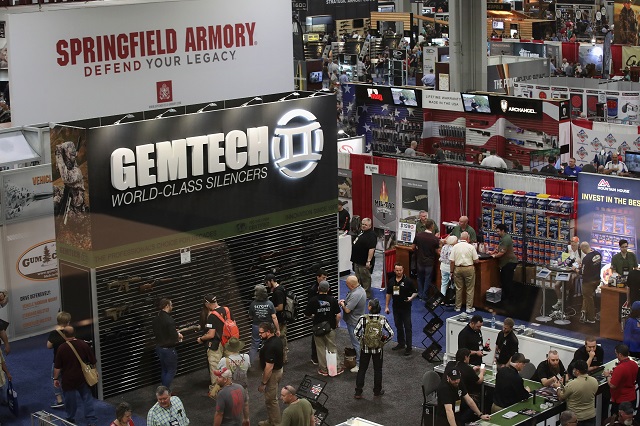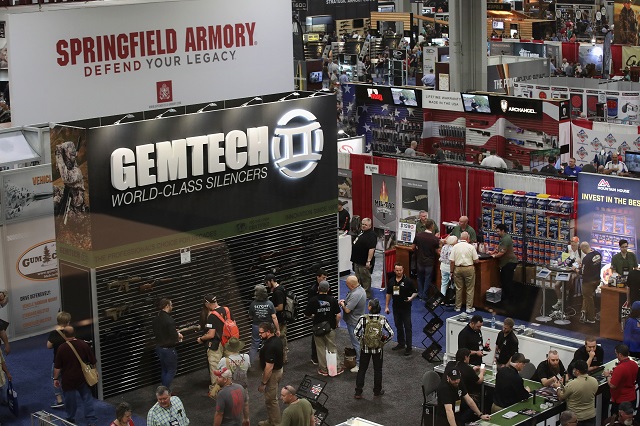 National Rifle Association members visit exhibitor booths at the 146th NRA Annual Meetings & Exhibits on April 29, 2017, in Atlanta, Georgia. With more than 800 exhibitors, the convention is the largest annual gathering for the NRA’s more than 5 million members. (Photo: Scott Olson / Getty Images)
National Rifle Association members visit exhibitor booths at the 146th NRA Annual Meetings & Exhibits on April 29, 2017, in Atlanta, Georgia. With more than 800 exhibitors, the convention is the largest annual gathering for the NRA’s more than 5 million members. (Photo: Scott Olson / Getty Images)
In November 1998, the largest tobacco manufacturers in the country entered into a “master settlement agreement” with the attorneys general of 46 states in order to settle public health lawsuits that threatened to beggar the industry. The attorneys general had sued on the grounds that they had incurred immense Medicaid costs as the result of the tobacco industry’s negligent marketing practices, causing millions of people to get hooked on cigarettes and suffering health effects that burdened the state health systems.
That same month, the City of Chicago filed a lawsuit against 22 gun manufacturers and sellers of guns in the Chicago suburbs and surrounding areas for causing a “public nuisance” in supplying and selling guns around the City at a level well above what the lawful gun market could support. The City’s theory of the case was that the manufacturers and sellers must have known that the guns would end up on the illicit secondary market — that is, on the streets of Chicago, where violence was continuing at high rates.
Congress has effectively exempted this one industry from the type of product liability and nuisance litigation that just about every other industry has to protect itself against.
The case wended its way through the court system for six years, finally being dismissed by the Illinois Supreme Court in November 2004. Chicago’s suit was one of several that had been filed along similar lines — all inspired by the success of the public suits against the tobacco companies. Most of these suits suffered similar ends by 2005 — when Congress passed the Protecting Lawful Commerce in Arms Act (PLCAA) which granted the gun industry immunity from civil liability for the unlawful use of guns except in narrow circumstances.
The PLCAA effectively exempted this one industry from the type of product liability and nuisance litigation that just about every other industry has to protect itself against: liability for the foreseeable misuse of their products. This immunity acted as a second shield for gun manufacturers and sellers, who already enjoy some level of protection from product liability suits because they traffic in “inherently dangerous” products, which users know are dangerous. Therefore, users themselves assume a significant level of risk for these products’ use.
However, as the tobacco story demonstrates, there is a precedent for compelling industries to take more responsibility for their dangerous products. The 1998 Tobacco Master Settlement Agreement required tobacco companies to amend their marketing practices and pay billions into a fund for health costs and wraparound services to cut down on smoking and fund education programs. However, with the PLCAA in place, no such reckoning appears to be on the horizon for the gun industry. Gun manufacturers’ immunity from civil lawsuits brought by the victims, families of victims and cities impacted by gun violence ensures that the industry does not have to engage in the type of risk-management any corporate counsel worth their expense account would insist upon: tightly managing supply and sales procedures that could potentially result in a foreseeable misuse of a weapon.
When it comes to guns, a neoliberal consensus about the moral rectitude of profits has elided the language of social rights.
The basic principle of these kinds of liability suits are that when manufacturers or wholesalers engage in a chain of commerce where even the intentional misuse of the product was foreseeable, those impacted by the misuse can bring a lawsuit against the links in the supply chain to recover damages. In the case of guns, the damages could be quite serious: When gun violence results in death, wrongful death suits can result in damages in the form of a victim’s lost lifetime earnings. The deterrent value of this type of potential litigation is immense.
Right now, “accountability” measures (which often result in incarceration) generally focus on individuals who use or are in possession of guns. This emphasis erases the origins of the weapons. Some 60 percent of gun crimes in Chicago can be sourced to gun sellers in Indiana, Wisconsin and Mississippi; more than 90 percent of those charged with gun possession were not the original buyers of the gun. This is because manufacturers and wholesalers can gleefully sell immense numbers of guns to small retailers and “hobbyists” with a wink and a nod, and these retailers can in turn sell large numbers of guns to cut-away dealers who flood Chicago’s streets. At the same time, retailers and gun show sellers can sell guns in questionable circumstances with minimal protocols for vetting the buyers. If a ruinous lawsuit was on the other end of that transaction, every link in the supply chain would be redoubling efforts to constrict sales to low-risk buyers; the volume of sales would assuredly plummet, but not in a way that dooms the lawful market. Even if we accept the premise that individual gun ownership is a fundamental constitutionally protected right and that there should be a viable commerce in firearms, there is no reason there should be a gun available for every single person in the country.
Violence outward is the depredation wrought by empire; violence inward is the decay wrought by neoliberalism, and together they are bleeding our streets.
In the same sense that narcotics like OxyContin or fentanyl are necessary but should only be sold wholesale through the medical industry — which is governed by regulations and professional codes of ethics, the violation of which can result in serious legal exposure — and carefully prescribed in indicated doses with attendant education, so guns should only be sold through carefully constructed networks of distribution that, through sheer self-interest, mitigate exposure to protracted and costly litigation.
Perhaps the gun industry is constitutionally protected; an unbounded market size certainly is not. When it comes to guns, a neoliberal consensus about the moral rectitude of profits has elided the language of social rights.
Guns, like cigarettes, are a public health crisis in the United States. This comes not only in the form of intentional gun violence: accidents and suicides are rampant, with gun death rates reaching nearly half the rate of diabetes. Since 2005, the turbocharging of the US’s overseas violent empire in the never-ending war on terror has infected domestic life, as new generations of veterans come home to a resource-deprived society, where the boundaries of the battlefield have transgressed national borders and the tactical ephemera of urban anti-insurgency warfare crop up on US streets. At the same time, austerity and privatization have stripped the bones of the social welfare that could ensure at-risk individuals have access to resources or counseling necessary to stem violence and self-harm. It is assumed that an industry’s righteousness is proved by its profits.
Violence outward is the depredation wrought by empire; violence inward is the decay wrought by neoliberalism, and together they are bleeding our streets.
Truthout Is Preparing to Meet Trump’s Agenda With Resistance at Every Turn
Dear Truthout Community,
If you feel rage, despondency, confusion and deep fear today, you are not alone. We’re feeling it too. We are heartsick. Facing down Trump’s fascist agenda, we are desperately worried about the most vulnerable people among us, including our loved ones and everyone in the Truthout community, and our minds are racing a million miles a minute to try to map out all that needs to be done.
We must give ourselves space to grieve and feel our fear, feel our rage, and keep in the forefront of our mind the stark truth that millions of real human lives are on the line. And simultaneously, we’ve got to get to work, take stock of our resources, and prepare to throw ourselves full force into the movement.
Journalism is a linchpin of that movement. Even as we are reeling, we’re summoning up all the energy we can to face down what’s coming, because we know that one of the sharpest weapons against fascism is publishing the truth.
There are many terrifying planks to the Trump agenda, and we plan to devote ourselves to reporting thoroughly on each one and, crucially, covering the movements resisting them. We also recognize that Trump is a dire threat to journalism itself, and that we must take this seriously from the outset.
After the election, the four of us sat down to have some hard but necessary conversations about Truthout under a Trump presidency. How would we defend our publication from an avalanche of far right lawsuits that seek to bankrupt us? How would we keep our reporters safe if they need to cover outbreaks of political violence, or if they are targeted by authorities? How will we urgently produce the practical analysis, tools and movement coverage that you need right now — breaking through our normal routines to meet a terrifying moment in ways that best serve you?
It will be a tough, scary four years to produce social justice-driven journalism. We need to deliver news, strategy, liberatory ideas, tools and movement-sparking solutions with a force that we never have had to before. And at the same time, we desperately need to protect our ability to do so.
We know this is such a painful moment and donations may understandably be the last thing on your mind. But we must ask for your support, which is needed in a new and urgent way.
We promise we will kick into an even higher gear to give you truthful news that cuts against the disinformation and vitriol and hate and violence. We promise to publish analyses that will serve the needs of the movements we all rely on to survive the next four years, and even build for the future. We promise to be responsive, to recognize you as members of our community with a vital stake and voice in this work.
Please dig deep if you can, but a donation of any amount will be a truly meaningful and tangible action in this cataclysmic historical moment.
We’re with you. Let’s do all we can to move forward together.
With love, rage, and solidarity,
Maya, Negin, Saima, and Ziggy
